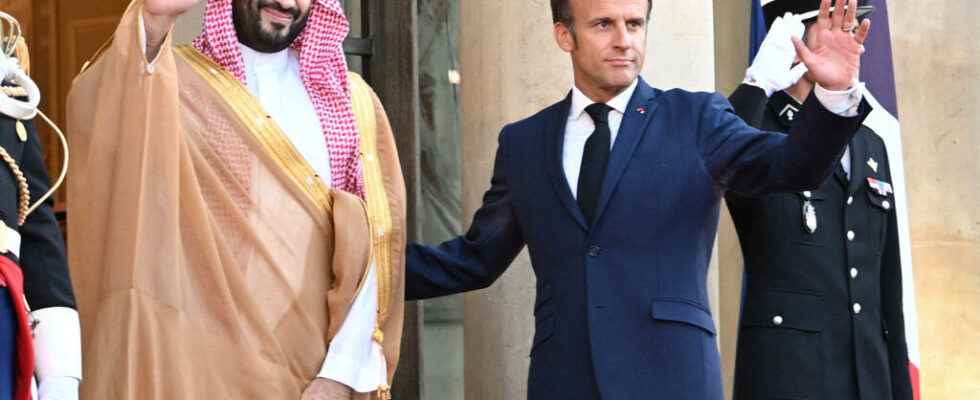The Saudi crown prince is received this Thursday evening July 28 at the Élysée. A visit that confirms the rehabilitation of Mohamed ben Salman on the international scene. He had been diplomatically kept away since the death of opponent Jamal Khashoggi in 2018. Agnès Callamard, Secretary General of Amnesty International, discusses for us the implication of this visit in the current context of war in Ukraine.
RFI: French President Emmanuel Macron had already visited Riyadh last December. Did you expect the rapprochement between the two men to continue?
Agnes Callamard : The rehabilitation of Mohamed Ben Salman is something we did not want to see happen. He is responsible for the atrocious murder of Jamal Khashoggi but also more broadly for increased repression in Saudi Arabia. He is also responsible for a war in Yemen that has claimed thousands of lives and is the worst humanitarian crisis in the world. This rehabilitation should not have taken place and it was not necessary. France could have continued its diplomatic relations with Saudi Arabia without rehabilitating Mohammed Ben Salman. It would of course have been a little more complicated, but it is not impossible.
► To read also Saudi Arabia: MBS and the Khashoggi affair, a turning point in 2018
From your point of view, is this visit proof of Paris’s weakness in the face of Riyadh or simply a bad diplomatic decision?
Both. First of all, it is proof of short-term weakness in a geopolitical system where, on the contrary, you have to be strong. Next, it is a lack of long-term vision that is particularly flagrant when one hears the current political discourse on Russian aggression in Ukraine. We cannot bench Russia for the horrific aggression it is carrying out against Ukraine, while strengthening our friendship with another state, Saudi Arabia, which is committing war crimes in Yemen for several years.
Unfortunately, it is not new to see Western diplomats turn a blind eye to certain practices of their allies.
Absolutely. Double standards are not a feature of 2022. However, in the past, a decade ago, Western democracies were ready to talk much more assertively and more systematically about human rights violations. and to make it one of the central points of their diplomatic approach. They didn’t censor themselves the way they do now.
Russia, China and other states are advocating an overhaul of the system, so that the values that we call “Western values”, democratic values, are set aside. So why facilitate their victory? Because that’s what we’re doing.
Precisely, did the Russian invasion in Ukraine give rise to a wake-up call on these issues?
No, it’s a failure. For the moment, values are not put back at the center of our approach. We see a permanent double standard. We have seen it with American policies, we see it with European policies. Speeches are not enough, we must also take action, and this is not the case at the moment.
In particular, we should try to create a strong coalition around these values. It didn’t happen. We are just negotiating with Saudi Arabia, Israel and a few other states that have access to oil.
So we don’t have a coalition against Russian aggression. We only have a very weak coalition which will not allow us to oppose Russia in the long term. It is very worrying for us. This is very worrying for all those who believe in these values and who believe in the Ukrainian victory against Russia.
It is a victory that cannot only be military. It is also played on values. When you put on the red carpet for dictators around the world, you lose on all levels. So, from my point of view, what is happening at the moment is very worrying for the future: the future of our international system, the future of international governance and the future of our planet.
► Read also: Oil at the heart of the visit of the Saudi Crown Prince to France
Before becoming Secretary General of Amnesty International, you were Special Rapporteur to the United Nations. From your experience, do you still think that Western diplomacy is capable of questioning itself?
Of course, they have demonstrated it in the past and they can demonstrate it again. I still have conversations from time to time with certain political representatives at the highest level, whether in the United States or in Europe. I understand that you have to talk to Saudi Arabia and other states that have access to oil. But why not also go and see all these States which may not have the same economic values, but which are able to convey important political messages, whether in Latin America or on the African continent? Today in Latin America, we speak only with Venezuela. Why ? Because there is oil. But the other countries also have things to say, messages to convey. They can be part of a coalition. Why not do it ?
Why not speak much more extensively with South Africa which is calling for a revival of the non-aligned movement? Russia has understood very well where its allies are today. And she is taking the appropriate steps.
Europe and the United States could build a coalition that would hold up much more politically. They’ve done it before and could do it again, but they can’t afford it. We must deploy economic means, political means. Perhaps we should tackle debt issues which are very important issues in Africa in particular, give something, but build a coalition based on a minimum of common values. And that, we don’t do.
